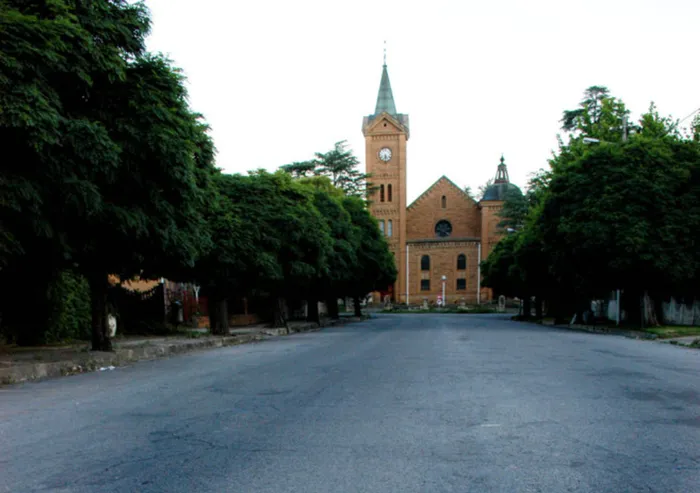Christians beware! Your religion is under threat

161106. Cherry Festival 2006 held is Ficksburg. The 100 year old NG Kerk made out of sandstone. Picture: Karen Sandison 161106. Cherry Festival 2006 held is Ficksburg. The 100 year old NG Kerk made out of sandstone. Picture: Karen Sandison
If democracy is essentially the rule based on the will of the majority of people, how come the Christian faith, the religion practised and observed by an unassailable number of South Africans, is under threat from our rulers?
And, at this possibly defining moment for Christians in our fledgling democracy, how are we expected to react to the possible scrapping of Christian public holidays that honour the religious beliefs of nearly 80 percent of the population? Are we to turn the other cheek? Hell no! Those who run the Commission for the Promotion and Protection of the Rights of Cultural, Religious and Linguistic Communities have got it all wrong.
For the uninitiated, the organisation’s chief executive, one Pheagane Moreroa, put it thus: “We received four complaints from people in their personal capacities. The first raised issues of unfairness, highlighting that calendar holidays only favoured Christians whereas people from other faiths have to sacrifice a day’s leave.”
How did Moreroa and his team not realise that at the very heart of this complaint is fundamentally a work-related issue that needed to be forwarded to the Department of Labour? In my view, it seems as if the complainant could not lose his or her day’s wage, Christians could have their public holidays just as they have since time immemorial.
The commission says the second and fourth complainants “claim the sole recognition of Christianity deepened religious divides”. Well, first and foremost, the complaint lacks factual basis. Since the advent of our democracy in 1994, we’ve seen the utmost respect being extended to all other religions.
The days of Christianity being solely recognised as the existing religion are all but gone. Jewish people, Muslims, Hindus and even non-believers would attest to a paradigm shift since Nelson Mandela became our first black president.
The Cape Chamber of Commerce’s president, Michael Bagraim, is really more concerned about the adverse effects of public holidays on the economy. He does not believe that other religions are discriminated against. He was quoted as saying: “Last year, employees could take three days’ leave between Easter and Workers’ Day and be absent from work for 11 days. Business paid a full month’s wages for just 16 days of work.” Quite straightforward! How his concern now forms part of antagonising our sacred days such as Easter and Christmas beggars belief.
But to the men and women at the helm of the relatively little known Commission for the Promotion and Protection of the Rights of Cultural, Religious and Linguistic Communities, the complaints against almost 80 percent of South Africans’ harmless commemoration and celebration of their special days have warranted a fanfare of some sort.
Today the commission was to hold a public meeting in Bloemfontein, tomorrow in Bethlehem, on June 21 in Durban and June 28 in Cape Town.
As I mentioned earlier, the dominance of Christianity has taken a major knock since the advent of our democracy. As African Christian Democratic Party leader Kenneth Meshoe, observed: “Easter Monday, which was changed to Family Day, and Ascension Day have already been removed from the calendar.”
I believe that every citizen has a right to be protected and defended under a constitutional democracy.
I would find it quite preposterous should the public meetings result in the further clipping of wings of Christian domination by a commission that should perhaps be focusing more on glaring linguistic inequalities despite claims that SA has 11 official languages.
Instead of the public meetings set off by the complaints against Christianity, the commission should perhaps undertake major public awareness campaigns to educate South Africans about its mission and vision.
For voting citizens who practise Christianity and who have returned the ruling party to power at every election since April 1994, any adverse finding against their religion would be viewed as a form of religious persecution and intolerance.
Our country has many social ills. The legitimacy of the state to rule over citizens is gradually questionable. Crime continues to be public enemy number one, women and children are hardly safe in a supposedly free country, most young people are unemployed, more people are joining the social grants queue daily, the rich get richer and the poor poorer. These are the areas that require urgent attention, not whether to abolish Christian holidays.
Remember, even at the height of apartheid, we were allowed to flaunt our Bibles without being made to feel that we are offending anyone – for we were offending no one.
l Makoe is the founder and editor-in-chief of the Royal News Services.